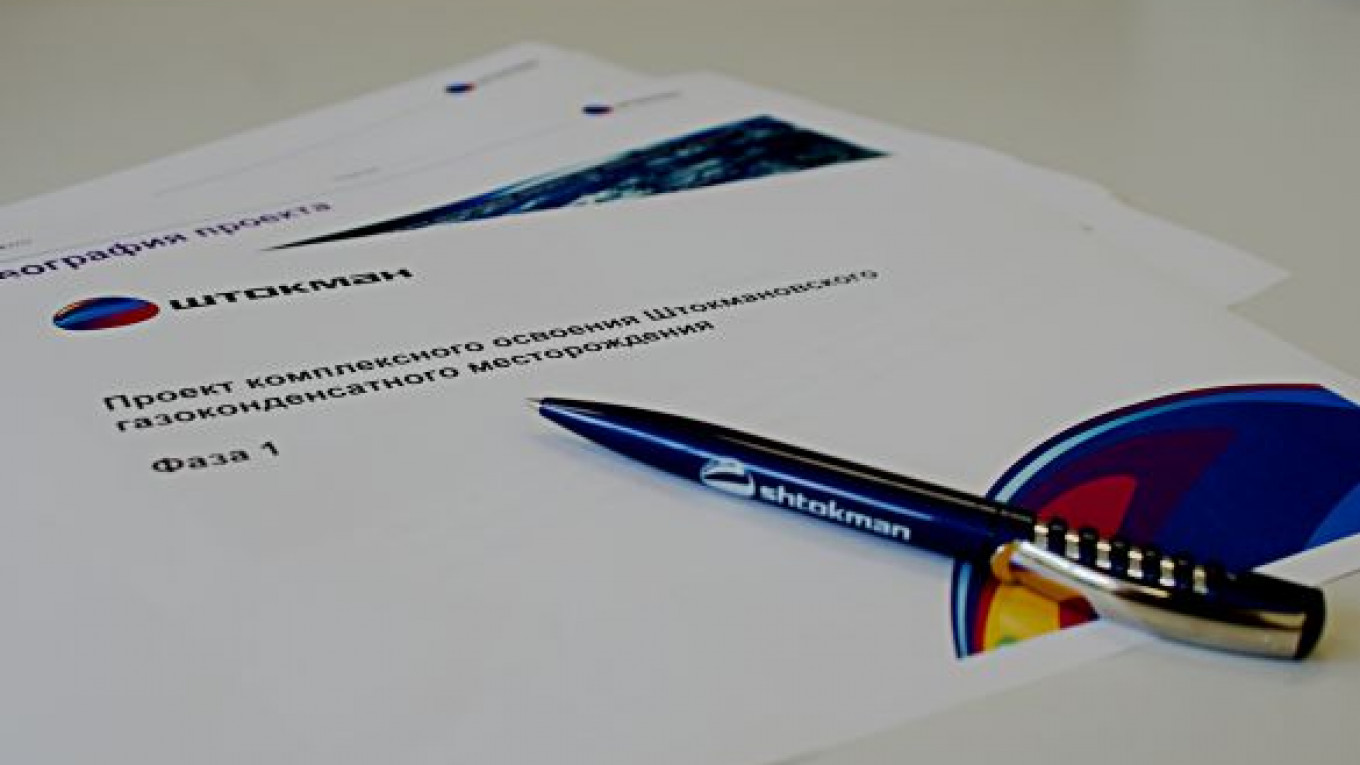Development of the vast Shtokman gas field will be put on hold indefinitely until a more cost-effective plan can be worked out, a Gazprom executive said.
Vsevolod Cherepanov, head of Gazprom’s production department, told journalists in Stavanger, Norway, on Wednesday that the firm had agreed with partners Total and Statoil that the project was not feasible at current costs.
“All parties have come to the conclusion that the financing is too high to be able to do it for the time being,” he said, Reuters reported. An investment decision could be made in 2014, he added.
It is the latest setback to the much-delayed Arctic extraction project that brought the gas giant together with France’s Total and Norway’s Statoil.
Gazprom originally said in 2008, when the partnership was formed, that pipeline gas exports from the region would start in 2013 and shipment of liquefied natural gas, or LNG, in 2014. By 2010, those dates were pushed back to 2016 and 2017, respectively, and that schedule was dependent on an investment decision being made in 2011.
The physical challenges of developing Shtokman, which lies about 550 kilometers offshore in the Barents Sea, are vast and prohibitively expensive.
The Shtokman natural gas field, in the Russian section of the Barents Sea, is believed to be one of the largest in the world. It is estimated to hold 3.8 trillion cubic meters of natural gas and 37 million tons of natural gas condensate.
The costs of the first stage of the vast project, which will require rigs to drill far from land in treacherous seas, the laying of an undersea pipeline and the construction of a gas-liquefying plant near Murmansk, have been estimated at as much as $15 billion. Gazprom, France’s Total and Norway’s Statoil formed Shtokman Development AG in 2008 to build infrastructure for the project’s first stage.
Gazprom held 51 percent in the group, Total 25 percent and Statoil 24 percent.
But the three had failed to reach an investment decision on the project when a framework agreement on Stage One of development lapsed on June 30.
Gazprom has the right to demand that the minority shareholders hand in their shares if the framework agreement lapses without an investment decision.
Statoil last month handed back its shares in the project, saying it had written off about 2 billion Norwegian crowns ($336.2 million) in investment after investors failed to meet the deadline.
A shareholder meeting to discuss Total’s possible withdrawal from the project has been postponed until Sept. 4, Interfax reported Wednesday.
Both Gazprom and Statoil, however, denied that Cherepanov’s statement means talks on continuing the project had broken down. “We have previously confirmed that we decided not to extend the existing framework agreement for the Shtokman phase 1 project. … For Shtokman to be commercially viable, we need a new framework agreement with different terms and conditions. We are still negotiating with Gazprom regarding new terms to make the Shtokman development possible,” Statoil spokesman Bård Glad Pedersen said in e-mailed comments.
“Gazprom is currently continuing negotiations on realizing the Shtokman project,” Gazprom said when asked about the status of the talks.
Cherepanov said Wednesday that Gazprom would decide on partners for the project within the month.
Industry sources have speculated that Royal Dutch Shell may step in if Statoil or Total drops out. Cherepanov confirmed Wednesday that the Anglo-Dutch firm has expressed interest, Reuters reported.
Analysts say that the collapse of natural gas prices following major breakthroughs in shale-gas extraction in the United States — a major potential market for Shtokman LNG — has made the project effectively unfeasible.
Economic doldrums in Europe prompted the Economic Development Ministry to cut its overall gas export forecast for this year to 193 billion cubic meters, down from an earlier forecast of 212 bcm. The ministry has said Gazprom urgently needs to improve efficiency of investment or face becoming uncompetitive in both domestic and international markets, Vedomosti reported Wednesday.
A particular threat comes from the United States, which experts say could become a competitor in the European market as early as 2016. ExxonMobil and Qatar Petroleum agreed this summer to invest up to $10 billion in converting a Louisiana terminal originally intended to import LNG into an export facility.
A similar project with Cheniere Petroleum is already approved. According to the U.S. Energy Information Administration, American gas production will exceed consumption by 2021, and export capacity could reach 40 bcm in 2035.
State-owned Gazprom remains Russia's largest natural gas producer and exclusive exporter, but it has been losing ground on the domestic market to independent firms like Novatek, which is selling to major corporate consumers like E.On Russia and Fortum. Novatek is also seeking permission to break into the export market, billionaire shareholder and board member Gennady Timchenko told Bloomberg in May.
Staff writers Howard Amos and Anatoly Medetsky contributed to this article.
Related articles:
A Message from The Moscow Times:
Dear readers,
We are facing unprecedented challenges. Russia's Prosecutor General's Office has designated The Moscow Times as an "undesirable" organization, criminalizing our work and putting our staff at risk of prosecution. This follows our earlier unjust labeling as a "foreign agent."
These actions are direct attempts to silence independent journalism in Russia. The authorities claim our work "discredits the decisions of the Russian leadership." We see things differently: we strive to provide accurate, unbiased reporting on Russia.
We, the journalists of The Moscow Times, refuse to be silenced. But to continue our work, we need your help.
Your support, no matter how small, makes a world of difference. If you can, please support us monthly starting from just $2. It's quick to set up, and every contribution makes a significant impact.
By supporting The Moscow Times, you're defending open, independent journalism in the face of repression. Thank you for standing with us.
Remind me later.


